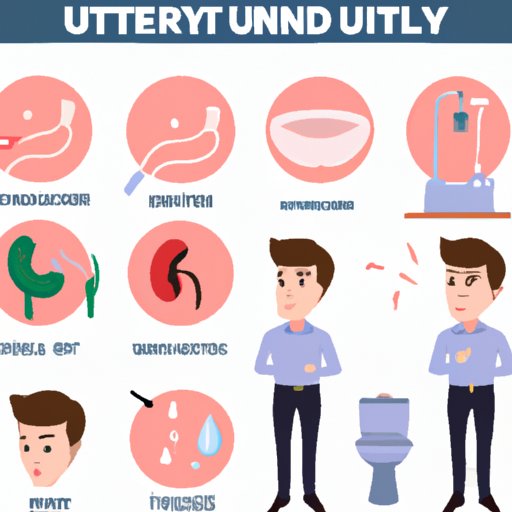
Introduction
Urinary tract infections (UTIs) are typically associated with women, but men can also experience them. UTIs occur when bacteria enter the urinary tract, causing inflammation and infection. Although UTIs in men are less common than in women, they can still occur and cause discomfort and health complications if left untreated. It’s important to recognize the symptoms of UTIs in men and seek prompt treatment to prevent further complications. This article will provide an overview of the symptoms of UTIs in males and the importance of seeking medical attention.

Male UTIs: Recognizing the Symptoms and Seeking Treatment
UTIs in men are less common than in women, but they can still occur and cause significant discomfort. The symptoms of a UTI in men can include pain or burning during urination, a frequent urge to urinate, cloudy or strong-smelling urine, pain in the lower abdominal or back area, and even fever or chills. It is essential to seek prompt medical treatment if these symptoms occur.
Left untreated, a UTI in a male can result in a bladder or kidney infection. These infections can lead to more severe symptoms, such as nausea and vomiting, high fever, and severe pain in the abdomen or back area. In severe cases, a male UTI can even lead to sepsis, a potentially life-threatening condition.
When to See a Doctor: 5 Symptoms of UTIs in Men
If you experience symptoms of a UTI, it is crucial to pay attention to your body and seek medical treatment as soon as possible. Here are five common symptoms of UTIs in men that should prompt a visit to the doctor:
Pain or Burning Sensation during Urination
One of the most common symptoms of a UTI in men is pain or a burning sensation during urination. The urethra, which is the tube that carries urine out of the body, becomes inflamed and irritated by the bacteria. This can cause discomfort and pain, especially during urination.
Frequent Urge to Urinate
If you have to urinate frequently, and your trips to the bathroom are small, this may indicate a UTI. Bacteria in the urinary tract can cause inflammation and irritation, leading to urinary urgency.
Cloudy or Strong-smelling Urine
Another common symptom of a UTI in men is cloudy or strong-smelling urine. This indicates an increase in bacteria in the urinary tract.
Pain in the Lower Abdomen or Back
Pain in the lower abdomen or back can also be a symptom of a UTI in men. This occurs as the bladder and urinary tract become more inflamed and irritated.
Fever or Chills
In severe cases, a UTI in men can result in a fever or chills. This indicates that the infection has spread to the kidneys and requires immediate medical attention.
A Guide to UTI Symptoms in Men
While the above symptoms are the most commonly experienced, there are additional symptoms that may indicate a more severe infection. These symptoms include:
- Blood in the urine
- Nausea and vomiting
- Pain in the side or groin area
- Foul-smelling urine
- Feeling generally unwell
It’s also important to note that the symptoms of a UTI in men can differ from those experienced by women. Men are more likely to experience pain in the rectal area or prostate gland.
UTIs Unmasked: How Men Can Identify the Signs
UTIs in men can occur when bacteria enters the urinary tract through the urethra. Risk factors for developing a UTI include an obstruction in the urinary tract, such as an enlarged prostate, a weakened immune system, and a history of UTIs. Men who engage in anal sex are also at an increased risk of developing a UTI.
It’s essential to understand and recognize the symptoms of a UTI to prevent further complications. Men should seek prompt medical treatment if they experience any symptoms of a UTI to prevent it from progressing to a more severe infection.
Are You at Risk? Common UTI Symptoms in Men
There are several risk factors for developing a UTI in men, including:
- Kidney stones
- Obstruction in urinary tract
- Diabetes
- A weakened immune system from medications or illness
- Enlarged prostate or prostate cancer
- History of UTIs or sexually transmitted infections
- Strenuous exercise leading to sweat accumulation in the groin area
While not necessarily a cause of UTIs, frequent or unprotected sexual activity can increase the risk of urinary tract infections. To reduce the risk of developing a UTI, men can:
- Stay hydrated and urinate frequently
- Practice good hygiene, including cleaning the genital area before and after sexual activity
- Avoid prolonged exposure to moisture and sweat in the genital area
- Urinate after sexual activity to flush out any possible bacteria
The Silent Threat: Knowing the Symptoms of Male UTIs
UTIs in men can go undetected because the symptoms may not be immediately apparent or may be mistaken for other conditions. If left untreated, a UTI can result in complications such as bladder and kidney infections, which can lead to more severe symptoms and require more invasive medical attention. It’s essential to take any symptoms seriously and seek prompt medical treatment if you suspect a UTI.
The Importance of Early Detection: Male UTI Symptoms to Watch For
The potential complications of an untreated UTI are severe, and it’s essential to seek medical attention right away if you experience symptoms. If left untreated, a UTI can turn into a kidney infection, leading to significant health issues. Seeking prompt medical attention is critical in preventing more severe symptoms and complications.
Conclusion
UTIs in men are less common than in women, but they can still occur and cause significant discomfort and health complications if left untreated. Recognizing the symptoms of UTIs and seeking prompt medical attention is crucial in preventing further complications and ensuring proper treatment. If you experience symptoms of a UTI, it’s essential to take them seriously and seek medical attention as soon as possible.
Remember to stay hydrated, practice good hygiene, and seek medical attention if you suspect a UTI. Doing so can help prevent complications and ensure a healthy urinary tract.
Resources for More Information or Assistance
If you have further questions about UTIs in men or need assistance finding a medical provider, the following resources can help:
- Centers for Disease Control and Prevention: Urinary Tract Infection in Men
- Urology Care Foundation: Urinary Tract Infections in Adults
- American Urological Association:




